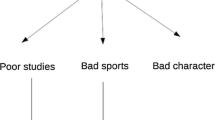Abstract
Ellis and Knaus (1977) have given an extremely helpful account of procrastination and how to overcome it. Their account focuses on irrational beliefs concerning the immediate task, and on ways of disputing those beliefs. Procrastination can also occur because of beliefs about the consequences of succeeding at the task. This paper describes four paradigms of cases that fall outside the framework provided by Ellis and Knaus. In these cases, therapeutic interventions aimed at beliefs about the task itself will fail, seemingly because of deep or dynamic motivations. If therapeutic attention is shifted from the presenting problem to the secondary ramifications of the problem, then rational-emotive theory can account for the cases without recourse to psychodynamic explanations.
Similar content being viewed by others
Reference Note
Ellis, A.Suggestions for research studies related to the theory and practice or rational-emotive therapy. Remarks presented at the First National Conference on Cognitive Behavior Therapy Research, Los Angeles, 1976. (Available on tape from Institute for Rational Living, 45 East 65th Street, New York, New York 10021.)
References
Ellis, A., & Harper, R. A.A new guide to rational living. North Hollywood: Wilshire, 1975.
Ellis, A., & Knaus, W.Overcoming procrastination. New York: Institute for Rational Living, 1977.
Geis, H. J. The psychology of dieting.Rational Living 1970,5 24–33.
Kazdin, A. E. Fictions, factions, and functions of behavior therapy.Behavior Therapy 1979,10 629–654.
Masserman, J. H.Behavior and neurosis: An experimental psychoanalytic approach to psychobiologic principles. Chicago: University of Chicago Press, 1943.
Meehl, P. E. Schizotaxia, schizotypy, schizophrenia.American Psychologist 1962,17 827–838.
Walen, S. R., DiGiuseppe, R., & Wessler, R. L.A practitioner's guide to rational-emotive therapy. New York: Oxford University Press, 1980.
Author information
Authors and Affiliations
Additional information
Insights gained while attending one of Albert Ellis's practica contributed to both the content and the completion of this paper. Don Beal, Craig Beaver, Maggie Frame, Bobbie Hopes, Katherine Kowal, and Blanche Thompson provided helpful criticisms, comments, and suggestions in response to earlier versions of this paper.
Rights and permissions
About this article
Cite this article
Rorer, L.G. “Deep” RET: A reformulation of some psychodynamic explanations of procrastination. Cogn Ther Res 7, 1–9 (1983). https://doi.org/10.1007/BF01173419
Issue Date:
DOI: https://doi.org/10.1007/BF01173419




